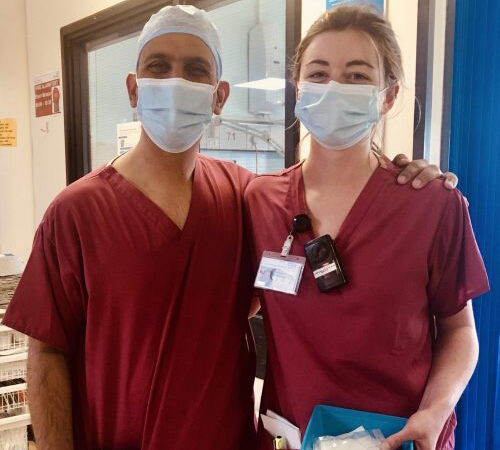
A general surgery team from University Hospitals Sussex NHS Foundation Trust has been nationally recognised for an innovative sustainable healthcare project that was judged good for patients and good for the planet.
The team, that works across the Royal Sussex County Hospital and the Princess Royal, were one of five surgical teams from across the UK competing in the first ever ‘Green Surgery Challenge’ to show how, by inventing new devices, switching to re-usable equipment and changing the type of anaesthetic they use, they have successfully reduced the carbon footprint of operations.
The NHS accounts for 4% of the UK’s carbon footprint, and operating theatres have particularly high energy use. The Green Surgery Challenge is aimed at helping the NHS meet its commitment to achieve net zero by 2040.
The five surgical teams all received mentoring from sustainable healthcare specialists at the Centre for Sustainable Healthcare. The winner – Leeds University Hospitals NHS Trust – was announced at the Green Surgery Conference today, co-hosted by the Royal College of Surgeons of England and the Centre for Sustainable Healthcare.
The UHSussex project looked at reducing the number of blood tests a patient needs before an operation; saving patient time, money and reducing carbon footprint.
Dr Alyss Robinson, Core Surgical Trainee, Mr Shameen Jaunoo, Consulant Oesophagogastric Surgeon and Professor Mansoor Khan, Honorary Professor of Trauma Surgery, were behind the project.
Alyss said: “We were delighted to have been chosen – it’s an incredible initiative!
“Our project aims to reduce the number of blood tests a patient needs before an operation, as often these tests are not actually used or change the management of the patient.
“The blood test of interest costs approximately £12. Patients have to travel to the hospital to have the test done which is inconvenient for them and has significant associated carbon emissions.
“This simple intervention could reduce the Trust’s carbon footprint by 2.5 tonnes CO2e and save >£3000 per year for laparoscopic cholecystectomies (keyhole gallbladder removal) alone and does not compromise patient safety. This will also mean patients have to attend fewer appointments.”
Alyss added: “Previously no-one had challenged the status quo on this. Our results can maybe show people that they can think about what they need to do and what they can do to make differences and savings.
“It is very easy to implement, very easy to measure and very easy to see the benefits in terms of patient time, travel and carbon footprint. Good for patients and good for the planet.
“I am pleased that the conversation about the environmental impact of healthcare has started, and it seems to finally be on the NHS agenda.”
“This competition is great for raising the profile of projects, highlighting what’s possible and long may it continue. If it can inspire more people to get involved and think about how they can make positive difference too then that is brilliant.”
Alyss added: “We hope that our simple intervention can be adopted by Trusts across the UK, and even worldwide.”
Tim Goodacre, Vice President, Royal College of Surgeons of England said:
“It’s been exciting helping to judge these excellent examples of surgical teams taking on the challenge of climate change.
“As world leaders come together at the COP26 summit, the pressure is on each and every one of us to look at how we can reduce our carbon footprint, both at home and at work. The teams have been inventive and focused in their approaches to reducing the carbon footprint of operations.
“We are facing a climate emergency, and every sector needs to respond. The NHS is committed to achieve net zero carbon emissions by 2040, so we need to help spread these good ideas and continually look to improve further, if we are going to play our part.”